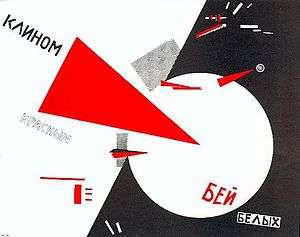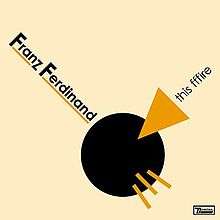Beat the Whites with the Red Wedge


Beat the Whites with the Red Wedge ("Клином красным бей белых!") is a 1919 [1] lithographic Soviet propaganda poster by artist Lazar Markovich Lissitzky, better known as El Lissitzky, "the man through whose exertions the new Russian ideas became generally understood in Western Europe".[2] In the poster, the intrusive red wedge symbolises the bolsheviks, who are penetrating and defeating their opponents, the White movement, during the Russian Civil War. It is an example of Constructivism.
The image became popular in the West when Lissitzky moved to Germany in 1921. It is considered symbolic of the Russian Civil War in Western publications.
Modern use
A simplified version lacking the smaller details is used by the Peacekeepers in the television series Farscape.
English doom metal band Witchfinder General employ the red wedge motif in the artwork accompanying their 1982 EP Soviet Invasion.
A similar simplified version (rotated 1/4 turn clockwise) was appropriated by the German post-punk band Mekanik Destruktiw Komandoh (MDK) for their 1983 12" single Berlin, released on the sixth international label.
The Australian Trotskyist organization Socialist Alternative incorporates the red wedge in its logo.
The German/Austrian Marxist organization Gruppen gegen Kapital und Nation uses a simplified version of the poster as its logo.
Franz Ferdinand used the image as inspiration for the cover of their single This Fire.
The logo and the name was used by a socialist music and arts organisation in the UK, Red Wedge, which campaigned against the Thatcher government in the lead up to the 1987 general election (UK)
The Wake used the artwork for their twelve-inch single Something Outside in 1983.[3]
References
- ↑ Johanna, Drucker; McVarish, Emily (2009). Graphics design history: A critical guide. Upper Saddle River, NJ, USA: Graphics design history: A critical guide. p. 188. ISBN 978-0-13-241075-5.
- ↑ George Heard Hamilton. Painting and sculpture in Europe, 1880-1940. p. 317
- ↑ http://implica.tumblr.com/post/102929664780/the-design-appropriations-of-punk-and-the-new-wave
